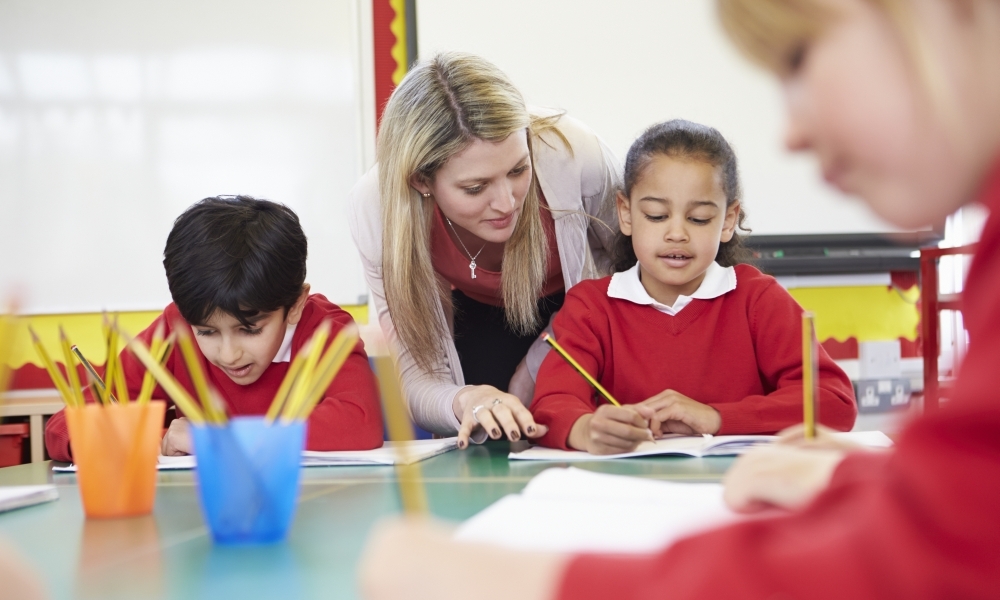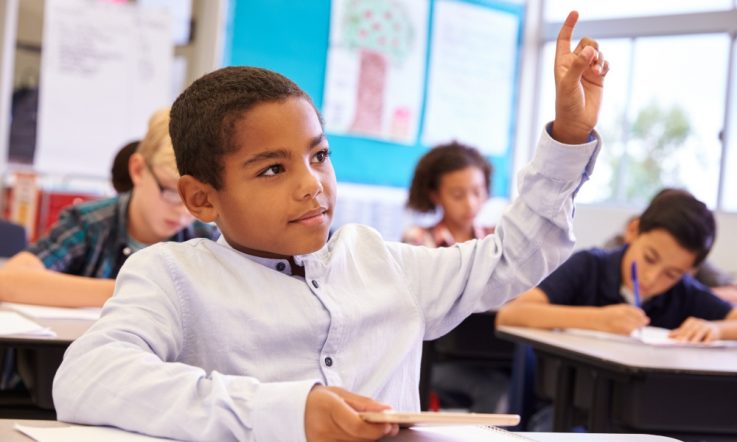Hello, happy 2022 and welcome to this Teacher podcast special – I’m Jo Earp.
In Australia, we’re at the start of another school year. That likely means new students and possibly a new learning space to set up. For those students who are moving up from preschool or primary or for those educators who switched jobs in the summer, it could mean getting to grips with completely different surroundings at a new school.
In this special episode, we’ve gathered a panel of experienced teachers and leaders, who will be sharing their priorities, strategies and tips for those first few weeks and for a successful year. There’s some great advice on things like classroom displays, professional learning needs, authentic activities, positive behaviour management, keeping on top of your email inbox and there’s lots more – so, let’s jump in.
JE: Okay, I’m going to start things off by going to Bonnyrigg, which is roughly an hour west of Sydney in New South Wales. Rebecca West is Deputy Principal Instructional Leader at Bonnyrigg Public School and was a top 10 finalist in the Global Teacher Prize for 2021.
Rebecca West: I think the big thing that teachers like to do is get their classrooms set up and looking pretty and that can lead to, I guess, maybe missing something else in the process. And I think I want to extend that notion that you don’t have to have a Pintrest-ready classroom at the beginning of the school year, you know.
It doesn’t need to be a blank state – you can have it looking wonderful and engaging – but don’t minimise the fact that your kids are going to come in and contribute something to that learning space, those learning walls; whether you’re developing vocab walls or maths walls, or things like that. Or, if you’re going to put up some artwork to showcase and say ‘hey, these are my kids and this is what they’ve produced in the classroom’.
JE: We’re staying on the topic of learning spaces and displays for now and still in New South Wales, up past Coffs Harbour on the Mid North Coast. Holly Millican is a mathematics teacher at South Grafton High School and a regular contributor to our YouTube channel.
Holly Millican: Now, for me personally, ensuring my learning space is set up in an organised, inviting and exciting way is a huge priority for those first few weeks of school. I’m incredibly lucky in my school to have all my classes in the same room, which gives me a huge scope for creativity. As many students see high school maths as the ‘boring’ subject, I try to alter this perspective from the moment they enter my classroom – displaying motivational and growth mindset posters, creating stations for group work and creating fun, engaging lessons which aim to get the students excited to learn about maths.
JE: Time for our first leadership perspective. We’re heading across the Bass Strait to Tasmania.
Nicole Wilson: Hi, my name’s Nicole Wilson – I’m the Assistant Principal at East Derwent Primary and I’m joined by David Webster who’s our Acting Principal at the moment. These are some of our leadership hints and tips for starting the new year.
David Webster: So, I think one of the big things around starting a year off well is actually done prior to the school year – getting things like your timetables, your documentation of how you do things. So, we have a school handbook, we’ve put a lot of work into that. But it wasn’t just operational, was it?
NW: No, so a lot of it is around our teaching and learning approach, and also our engagement strategies for students. So, things like ensuring we have even a professional learning calendar for next year, we know what our school improvement priorities are (and they’re informed by data) and ensuring also that we have role clarity within our leadership team.
DW: Yeah, so I guess we set ourselves up well for the first couple of days. And then, going on from there, we have a real priority around making sure that we have senior leadership work with all of our staff, like in a coaching capacity.
NW: Yeah, that’s right. And I think, as you mentioned David, having that balance on our initial PL [professional learning] days leading into Term 1 of 2022 – we’ve got a balance around having time for professional learning with staff, but also some time for staff to have in their classrooms to set up for the year.
DW: One of the interesting things about our school is that we have a lot of early career educators and we really heavily invest in their development. I think it’s so important to get that right because all the data says that investing in teacher practice [has] the biggest impact on student outcomes. So, one of the things we do have is we have a specific role as part of our leadership team to work with those early career teachers – we call it a pedagogical coach, but really it’s an early career coach.
JE: David Webster there was talking about the work that leaders do before the school year. Over in Western Australia, 200 kilometres south of Perth, Lisa Seewraj teaches at Child Side Playgroup and School in Boyanup – that’s a K-10 independent, co-educational school which has multi-age classes. Of course, that means that children will stay together in a cluster for several years. Here’s what Lisa had to say about the preparation for a new year that happens in her own school and classroom.
Lisa Seewraj: I’m currently working with a class of about 30 children that are Year 7-10 and I work with two other educators.
We’ve been setting our children up for successful transitions from the moment they start our school – so it’s not just something we consider just the fact they’re going to be moving from Year 6 to Year 7, this starts in Kindy. We have integrated programs that run across multiple year levels, that run every single week. This means that when we’ve got children moving from a cluster (so, moving from an early childhood cluster to a middle childhood cluster, or a middle childhood cluster to a high school/adolescent cluster) they’re already primed for that success because they know the environment they’re going to be moving into; it’s familiar, the children they’re working with are not strangers and the educators they’re working with are also very familiar by that stage as well.
So really, the set-up for the new year starts at the end of the previous year. I’m already getting prepped with things so that we might ease the transition. This includes several different actions – so we might, for example, have a group of children setting up the environment ready for the following year. This is actually a great activity, because it helps the children claim their space; it can reinvigorate an area.
JE: So, it’s a really different situation there in Lisa’s school with those multi-age classes and that leads to some opportunities for continuity, which we’ll return to later in this episode. For now though I want to head back to New South Wales, but this time we’re going to go rural – six hours northwest of Sydney to Gunnedah. Alex Wharton is Head of Middle School at Carinya Christian School. Here he is talking about setting up staff for success.
Alex Wharton: The start of the year is such an important time for schools and educators, isn’t it? I mean, in terms of setting culture, casting vision, establishing norms and routines. And so, when I’m working with staff, in particular as a school leader (educational leader in a school context), I’m really looking to develop those organisational and vision skills – vision and goal setting. And so, what that particularly looks like for me is I use a term planner which is kind of a table with all the weeks of the term set out really clearly with the major events that are happening.
And I kind of equip teachers to use this language around the ‘goal posts’ – what are we working towards – it could be things that are happening in our school community, it could be more formal assessments or informal assessment tasks, whole-school projects that we might be doing, other school priorities… And kind of using this language of being intentional around what we want to do and see in particular with staff is really important. So, for staff, I really think about term planners and organisation.
JE: Okay, so we’ve completed the first virtual check in with each of our panel members in this special episode on starting the new school year. Of course, we know that building strong relationships with students can make such a difference and that’s our next topic. Here’s Rebecca West again talking about an activity she likes to do with students, then you’ll hear from Alex Wharton, and finally Lisa Seewraj.
RW: So, something that I do at the beginning of the year is creating book covers with my kids where they colour in certain things and, you know, I teach them how to cover their book and if they’re littlies I’ll cover it for them. But I sit down with them and I colour in my own ones with them as well. And you just get to talk with the kids and shoot the breeze and see what they did in the holidays, or you’ll see who are those quiet kids that don’t want to engage with you, or who are the chatterboxes that are just ready to tell you their life story on the first day. I’ve found it’s a nice calming way to build a relationship with kids and kind of get on their level.
AW: [Thinking about your students] – the start of the year is so important for building relationships for the teachers. So, I really look at leading teams of teachers who are wanting to get to know their students particularly quickly. We think about the power of learning names and being able to relate well to students. And I think in the first lesson, there’s kind of this fork in the road where lots of teachers might get students to do kind of a holiday recount of perhaps their summer break, what they’ve been up to and use that as a get to know you; which is kind of a, in one ways, one springboard.
But really we want to encourage teachers to really be knowing their students deeply. To know particular interests, hobbies, skills, and be able to bring those into the classroom and build on that student capital. So really looking for activities – learning activities, purposeful activities – in that start of the year to build deep relationships with your students to get to know them and to have a culture which reflects the teacher themselves. Teaching is all about relationships, of course.
LS: I think because of my unique situation where I get to have continuity with the children (I teach over a period of years) our new school year prep is actually an ongoing process throughout the whole of the year. The class culture is really already established, so it is a continuation of where we left off. Now, that said, there are a few important considerations.
New children will be joining our group and long-term children that have been with us for years will have left, so the dynamic will be different in the class and it’s really important to take the time needed to build relationships during this period. Authentic activities are really beneficial for us – such as menu planning for the week and organising shopping lists, as we cook our own lunches.
It’s important to expect children are going to be nervous and let them know that this is perfectly normal. Careful choices in partnering and group work, as well as opportunities to visit with their previous educators and classmates can help mitigate this.
JE: Our panellists there talking about building relationships and getting to know your students deeply. That leads us onto knowing where students are at in terms of their learning and any individual needs, their passions and their interests – that all helps with engagement. Here are Nicole Wilson and David Webster explaining how that’s part of their school’s professional learning cycle.
NW: One of the key things that underpins all of our work at East Derwent is our commitment to learning, which is basically our Professional Learning Communities. We have inquiry cycles that go right throughout the year, and our first inquiry’s focused on getting to know our students. So, we need to know what our students are ready to learn, obviously because if we don’t, we don’t know where to teach and what their point of need is. So just ensuring that that’s a really solid focus at the start of the year for our teachers.
DW: Yeah, and I guess as we go further and further through the inquiry process, we get really quite in-depth, but I guess it’s narrowed and around our school priorities. So, over the last few years we’ve had a real focus on reading and oral language, but we’re moving more towards the comprehension and creation space. And that’s because of having some real success through all our results and we just want to consolidate that and try and ensure that our students are really successful in literacy as a whole.
NW: Yeah, and I guess in addition to that our inquiry cycle in that first term sort of really focuses in on the achievement standards in the curriculum and ensuring that staff are familiar with students’ individual needs – so, those particular students with individual education plans are really well targeted and catered for.
DW: One of the things that we’re working on improving all the time is about engaging students in areas of their interest. So, over the last year or so we’ve really listened to student voice and other data around what programs we want to offer. And we’ve brought back in a Performing Arts program into our primary school. We’re looking at some resilience programs; we’ve had a kitchen garden program; and in the Kinder space we’re working with specific gross motor programs for our Kinder students.
NW: Yeah, and all of those have been informed by data as well as student voice. So, ensuring that they’re really connected to our school priorities and we’re looking at, I guess, shifting our data in that positive direction.
JE: Another big topic is classroom management – including setting the tone, setting expectations and boundaries and so on. We’re going to hear from Holly Millican talking about what’s worked for her, and then Rebecca West challenges a piece of advice you may have already been given.
HM: Those first initial weeks can be so challenging – managing classroom expectations in a positive way and building those strong relationships with your students, while also maintaining a range of behaviour management strategies can often feel overwhelming. What has always worked for me, with behaviour management, is pulling students aside to have those hard conversations rather than calling them out in front of the entire class. This maintains the positive relationship you have begun to build and shows them you are willing to treat them as young adults rather than children.
RW: If anyone tells you ‘don’t smile until April’, don’t listen to them. I can’t believe people at universities are still teaching this. You can smile at your kids and still set very explicit expectations for behaviour in the classroom. And that would be my next key – setting expectations and being very explicit and clear about it and sticking to it.
If you’re going to tell the kids that this is the expectation and that there is a consequence or whatever for not following that expectation, follow through with it. Call home, talk to the parents, build that relationship early and make sure that kids know that what you say goes, because they will follow it. Kids love boundaries – you don’t think they do, but they actually really do thrive on knowing what the limit is and how they can be successful in the classroom. So, don’t worry about rushing to the curriculum, take time to set the expectations and build the relationships and then the curriculum will follow.
JE: For Lisa Seewraj, teaching a multi-age class means it may include multiple siblings, which brings a different dynamic.
LS: So, I’ve got families that might have three children in my learning cluster – so we talk to the children about how that is going to look, and how that’s going to feel, and strategies that they can use so that if they have things going on at home they don’t necessarily bring it into the classroom, and things that are going on in the classroom they don’t necessarily have to take home. We’re looking at that ‘code switching’ aspect.
JE: Okay, I want to move on to the topic of planning and preparation, and we’re going to start with the leaders on our panel. First up, you’ll hear Nicole Webster and David Wilson, Alex Wharton shares his thoughts on goal setting, and then Holly Millican explains why she likes to get her teaching resources in order well ahead of time.
NW: …some tips or strategies for an overall sort of how to start your year is around, I guess, being organised, but also flexible and agile. So, not being too rigid, but having a really clear direction on where your school is headed.
DW: Yeah, and I think the other thing that we’ve learnt over a long period of time is about minimising the distractions. So, so many different educational programs or external organisations want to be involved – and that can be a great thing, but it also can lead you off your path and your school improvement path. So, yeah, we’ve really tried to have a bit of tunnel vision knowing that there might be times where we have to adjust, but we want to make sure that we succeed in our priorities.
AW: When I think about my own priorities and strategies as a school leader and an educator, it really comes down to goal setting. So, kind of thinking: What are the big things that I’m looking to either achieve this term, that I want to drive this semester? The priorities that I’m looking to lead my staff in professional learning, in their own collaboration, in their own skillsets?
And I actually, I use the whole bunch of Post-its that I have up on a white board, I move them around, and it’s this dynamic conversation with myself and my colleagues about what is it that we really want to do this year? And then how are we going to do it? And having that strategy, that mission, and direction of course really permeating all that we do in the classroom and the start of the year is just so important for that.
HM: …my second priority is ensuring all resources for the first topic I’ll be teaching with each class are ready to go and that all associated lessons are pre-planned. By having this level of organisation in advance, my initial lessons aren’t spent trying to throw together last-minute resources or thinking about what lessons I need to plan for the next day; and my focus instead is on building strong, positive relationships with my students and actively assessing their abilities to ensure my lessons are targeted at the correct levels and that all students are able to succeed in my classroom.
JE: Okay, I’m going to hand over to Alex Wharton now to round off this special start of the year episode by sharing a couple of final tips.
AW: The first one is: join your professional associations and become involved. So, professional associations look like a group of professional, committed, dedicated teacher and educators working together on a common cause. They could be according to a particular KLA in the secondary (key learning area) or a particular interest and particular area of expertise for you.
And so thinking about, what are you interested in and passionate about? And you join these organisation’s mailing lists, you become a member, you go along to the professional development, and it’s a really important kind of start of the year checklist to say ‘how might this fit in with my own professional learning and development goals? Where do I want to go? And what are my areas of growth as an individual?’ And using the collective expertise of colleagues who have gone before you via the professional associations is so important. There are national associations, there’s state-based ones, there’s regional ones as well. So, certainly really encourage you to do that.
The second one is to start that process of the new year of taming your email inbox. And again, this kind of comes back to that organisation and admin. And teachers are there to teach – for a lot of us, we’re not natural administrators and often can be weighed down and burdened by that part of our role.
So, for what that looks like for me – and I encourage my teachers to do this – I create email list groups. So, I might create one for Year 7 English teachers for example, and create that. And depending on what email platform you use, you can create that and you add all the context wherever it is. So, if you’re emailing Year 9 Pastoral Care teachers, you set that up at the beginning of the year. So actually, when you share information, when you bring people on the journey, it’s one little tool in your email inbox that can actually really encourage good communication.
And similarly with that, I use email folders. So, I might file things by a particular year. And so if I’m a classroom teacher for example, I might have a Year 8 English email folder and I’ll have all the students’ names that I will file correspondence, their work, communication with parents and caregivers into the particular student files. So, it takes about 20-30 minutes really to set up for a whole bunch of folders, but using that filing system to really help you stay on top of your inbox, to work on that admin, will really help you as a teacher and as leader continue to have great success.
Yeah, you’re able to pull out information quickly, you’re able to continue to draw on evidence and rich illustrations of your own practice in terms of the impact you’re having on teaching and learning. Email can be untameable, but we want to use it as actually more of a tool than a burden.
All the best for a great year – let’s do this.
That’s all for this episode, a big thank you to my guests Alex Wharton, Nicole Wilson, David Webster, Holly Millican, Lisa Seewraj and Rebecca West. Thanks for listening, as usual, a full transcript of this episode is available at teachermagazine.com. Be sure to subscribe to our podcast channel on Spotify, Apple podcasts or SoundCloud, so you can be notified of any new episodes. While you’re there, we’d love for you to rate and review us in your podcast app.
What will your priorities be for the first few weeks of term? What about the next 12 months?
With a colleague, discuss strategies that have worked for you in the past. Are there any strategies used by others that you think would benefit you this year?
The panellists in this podcast talk about the importance of building strong and trusting relationships with your students. What strategies do you use to get to know new students and continue to strengthen the relationship?



